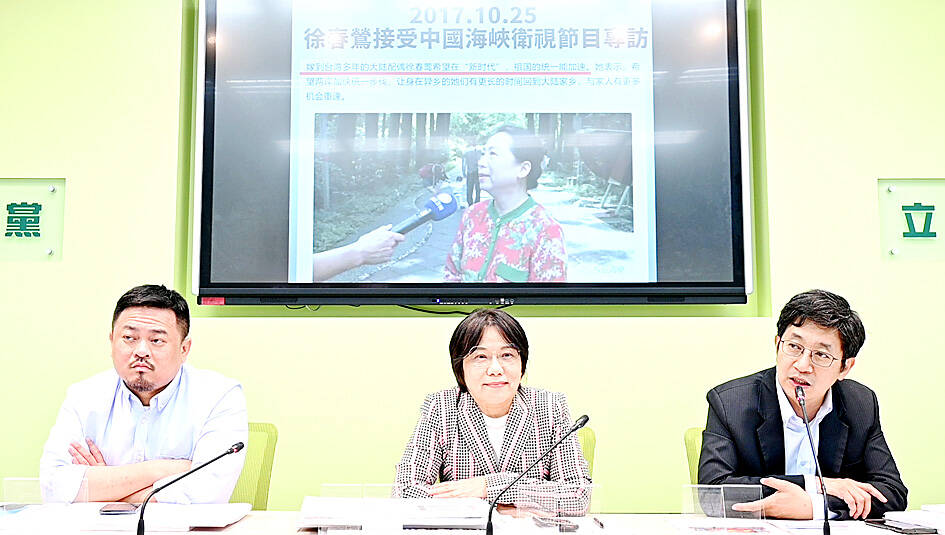Democratic Progressive Party (DPP) lawmakers yesterday said that if the Taiwan People’s Party (TPP) were to select a China-born legislative candidate it would pose national security concerns, while the TPP accused the ruling party of employing “double standards.”
The TPP has come under fire for its rumored selection of Taiwan New Residents Development Association chairwoman Xu Chunying (徐春鶯), the wife of a Taiwanese man and an advocate for foreign-born spouses, for its list of legislator-at-large nominees.
The TPP has yet to confirm or deny the selection of Xu, which was first reported by Mirror Media on Thursday last week.

Photo: Chu Pei-hsiung, Taipei Times
TPP Chairman and presidential candidate Ko Wen-je (柯文哲) on Sunday said that Xu was merely “under consideration” for a spot on the party’s list.
Xu in a statement released on Friday denied allegations that she was a member of the Chinese Communist Party (CCP) during her time in China, and that she had held a CCP-supervised position in Shanghai prior to moving to Taiwan in 1993.
Ko’s campaign director, Huang Shan-shan (黃珊珊), wrote on social media on Sunday that the DPP was hypocritical for criticizing Xu’s candidacy.
She said that the DPP appointed former CCP member Ning Jiarong (寧家榮) to an internal party committee several years ago.
The DPP should be consistent and “refrain from employing double standards,” Huang said.
Later the same day, Vice President William Lai, the DPP’s presidential candidate, told a campaign event in Hsinchu that Taiwanese “would not accept” Xu being given access to confidential foreign affairs and national defense documents.
Lai dismissed comparisons made between the TPP’s selection of Xu and the appointment of Ning to the DPP’s new residents committee, saying that the two cases were “completely different.”
Separately on Sunday, Ko told reporters that Xu would be asked not to sit on politically sensitive committees in the Legislative Yuan related to foreign affairs and national defense if elected as a TPP legislator, adding that she could instead join the legislature’s Internal Administration Committee.
Taiwan would not be considered a country ruled by law and order if a person who has obtained a Republic of China identification card cannot exercise the right to participate in politics, Ko added.
DPP Legislator Tsai Shih-ying (蔡適應) yesterday said that Ko’s remarks revealed two things.
“One is that the TPP has indeed decided to enlist Xu as one of its legislators-at-large,” Tsai said. “Second, it would be a ... conflict of interest if Xu were to be on the Internal Administration Committee, as the committee covers issues relating to laws such as the Act Governing Relations Between the People of the Taiwan Area and the Mainland Area (臺灣地區與大陸地區人民關係條例), Nationality Act (國籍法) and Household Registration Act (戶籍法), under all of which Xu is a person of concern,” he said.
Xu would not be a representative of the TPP, but a representative of the CCP in Taiwan, “which would be a great satire and pose great harm to Taiwan’s national security and democratic system,” Tsai added.
On Jan. 13 next year, Taiwanese are to vote to elect a president and vice president, as well as 113 members of the Legislative Yuan. This includes a total of 34 legislator-at-large seats, which are allocated to legislators selected from a party list rather than a constituency.
Additional reporting by Yang Yuan-ting

Nipah virus infection is to be officially listed as a category 5 notifiable infectious disease in Taiwan in March, while clinical treatment guidelines are being formulated, the Centers for Disease Control (CDC) said yesterday. With Nipah infections being reported in other countries and considering its relatively high fatality rate, the centers on Jan. 16 announced that it would be listed as a notifiable infectious disease to bolster the nation’s systematic early warning system and increase public awareness, the CDC said. Bangladesh reported four fatal cases last year in separate districts, with three linked to raw date palm sap consumption, CDC Epidemic Intelligence

Two Taiwanese prosecutors were questioned by Chinese security personnel at their hotel during a trip to China’s Henan Province this month, the Mainland Affairs Council (MAC) said yesterday. The officers had personal information on the prosecutors, including “when they were assigned to their posts, their work locations and job titles,” MAC Deputy Minister and spokesman Liang Wen-chieh (梁文傑) said. On top of asking about their agencies and positions, the officers also questioned the prosecutors about the Cross-Strait Joint Crime-Fighting and Judicial Mutual Assistance Agreement, a pact that serves as the framework for Taiwan-China cooperation on combating crime and providing judicial assistance, Liang

Reports of Taiwanese going missing, being detained or interrogated, or having their personal liberties restricted in China increased about fourfold annually last year, the Mainland Affairs Council (MAC) said yesterday. Last year, 221 Taiwanese who traveled to China were reported missing, were detained and interrogated, or otherwise had their personal freedom restricted, up from 55 the previous year, the council said. Reopening group tours to China would be risky, as it would leave travelers with no way to seek help through official channels after Beijing shut down dialogue between the associations tasked with handling cross-strait tourism, the MAC said. Taipei’s Taiwan Strait Tourism

SHIFT: Taiwan is evolving from a transit stop into a tourist destination, with more international travelers willing to spend on tours, dining and cultural activities Taiwan rose three places in the World Tourism Barometer to 36th globally in 2024, with international tourism revenue of US$10.028 billion, the Tourism Administration said on Monday. The UN Tourism Organization publication said that its focus has switched from whether a country has returned to pre-COVID-19 levels of tourism to the amount spent by a tourist during an overseas trip. The nation last year welcomed 8.57 million international tourists, about 9 percent more than in 2024, with most tourists coming from Japan, South Korea, and Hong Kong and Macau, all of which accounted for at least 1 million tourists each. During the first